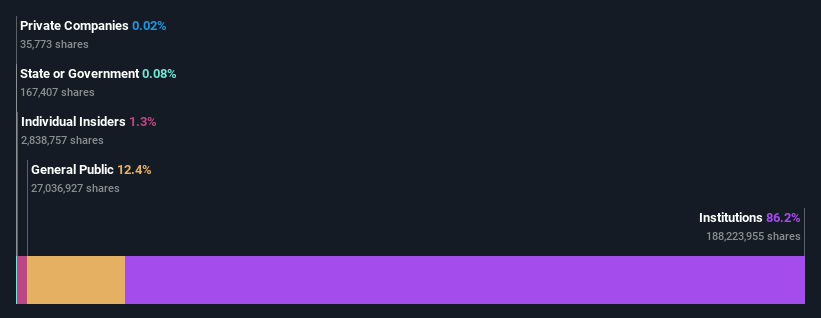Arthur J. Gallagher & Co.'s (NYSE:AJG) institutional investors lost 5.2% last week but have benefitted from longer-term gains
Key Insights
Significantly high institutional ownership implies Arthur J. Gallagher's stock price is sensitive to their trading actions
50% of the business is held by the top 15 shareholders
If you want to know who really controls Arthur J. Gallagher & Co. (NYSE:AJG), then you'll have to look at the makeup of its share registry. The group holding the most number of shares in the company, around 86% to be precise, is institutions. Put another way, the group faces the maximum upside potential (or downside risk).
Losing money on investments is something no shareholder enjoys, least of all institutional investors who saw their holdings value drop by 5.2% last week. However, the 13% one-year return to shareholders might have softened the blow. But they would probably be wary of future losses.
Let's delve deeper into each type of owner of Arthur J. Gallagher, beginning with the chart below.
View our latest analysis for Arthur J. Gallagher
What Does The Institutional Ownership Tell Us About Arthur J. Gallagher?
Institutions typically measure themselves against a benchmark when reporting to their own investors, so they often become more enthusiastic about a stock once it's included in a major index. We would expect most companies to have some institutions on the register, especially if they are growing.
We can see that Arthur J. Gallagher does have institutional investors; and they hold a good portion of the company's stock. This implies the analysts working for those institutions have looked at the stock and they like it. But just like anyone else, they could be wrong. When multiple institutions own a stock, there's always a risk that they are in a 'crowded trade'. When such a trade goes wrong, multiple parties may compete to sell stock fast. This risk is higher in a company without a history of growth. You can see Arthur J. Gallagher's historic earnings and revenue below, but keep in mind there's always more to the story.
Institutional investors own over 50% of the company, so together than can probably strongly influence board decisions. Arthur J. Gallagher is not owned by hedge funds. The company's largest shareholder is The Vanguard Group, Inc., with ownership of 12%. BlackRock, Inc. is the second largest shareholder owning 8.0% of common stock, and Capital Research and Management Company holds about 6.9% of the company stock.
After doing some more digging, we found that the top 15 have the combined ownership of 50% in the company, suggesting that no single shareholder has significant control over the company.
While studying institutional ownership for a company can add value to your research, it is also a good practice to research analyst recommendations to get a deeper understand of a stock's expected performance. There are a reasonable number of analysts covering the stock, so it might be useful to find out their aggregate view on the future.
Insider Ownership Of Arthur J. Gallagher
The definition of an insider can differ slightly between different countries, but members of the board of directors always count. The company management answer to the board and the latter should represent the interests of shareholders. Notably, sometimes top-level managers are on the board themselves.
I generally consider insider ownership to be a good thing. However, on some occasions it makes it more difficult for other shareholders to hold the board accountable for decisions.
Shareholders would probably be interested to learn that insiders own shares in Arthur J. Gallagher & Co.. It is a very large company, and board members collectively own US$659m worth of shares (at current prices). Most would say this shows a good alignment of interests between shareholders and the board. Still, it might be worth checking if those insiders have been selling.
General Public Ownership
The general public, who are usually individual investors, hold a 12% stake in Arthur J. Gallagher. While this size of ownership may not be enough to sway a policy decision in their favour, they can still make a collective impact on company policies.
Next Steps:
It's always worth thinking about the different groups who own shares in a company. But to understand Arthur J. Gallagher better, we need to consider many other factors. To that end, you should be aware of the 3 warning signs we've spotted with Arthur J. Gallagher .
Ultimately the future is most important. You can access this free report on analyst forecasts for the company.
NB: Figures in this article are calculated using data from the last twelve months, which refer to the 12-month period ending on the last date of the month the financial statement is dated. This may not be consistent with full year annual report figures.
Have feedback on this article? Concerned about the content? Get in touch with us directly. Alternatively, email editorial-team (at) simplywallst.com.
This article by Simply Wall St is general in nature. We provide commentary based on historical data and analyst forecasts only using an unbiased methodology and our articles are not intended to be financial advice. It does not constitute a recommendation to buy or sell any stock, and does not take account of your objectives, or your financial situation. We aim to bring you long-term focused analysis driven by fundamental data. Note that our analysis may not factor in the latest price-sensitive company announcements or qualitative material. Simply Wall St has no position in any stocks mentioned.

 Yahoo Finance
Yahoo Finance 

